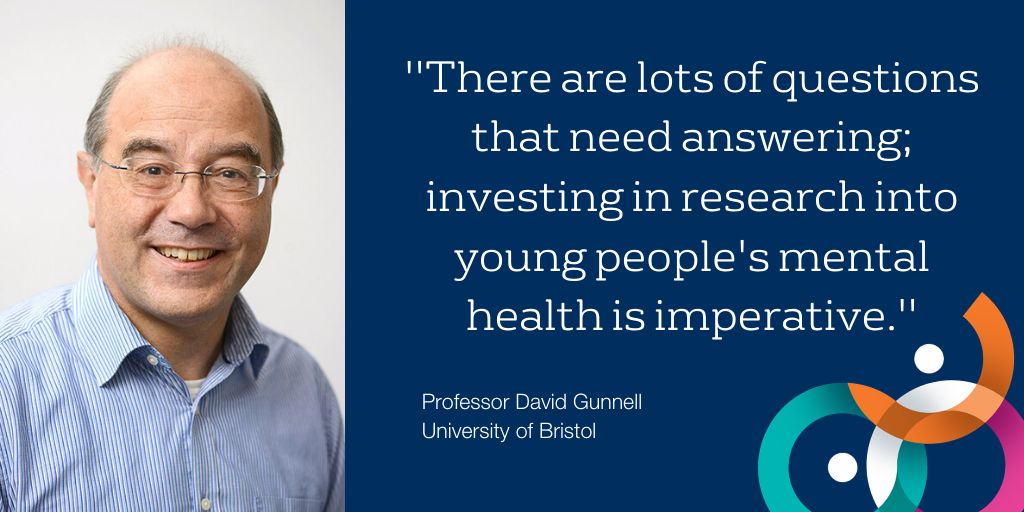As a Public Health Physician and Population Mental Health scientist, my interest is in understanding what improves the health, or reduces the risk of mental ill health, in the population as a whole. The impact on population health and mental health of COVID-19 is clearly top of everyone’s agenda right now, and my heart goes out to all those who have been, and will be, affected.
Aside from this, and it is hard to think about much else right now, one of the big issues in population mental health research in recent years is the concern that there has been a rise in levels of depression, anxiety, self-harm, suicide attempts and suicide amongst young people. These trends are seen in the UK, USA and Australia. Over the last couple of years we’ve done a number of studies documenting this rise –firstly by triangulating data from a number of sources to determine whether the rise is real, rather than due to changes in recording or measurement, and more recently to try and understand some of the factors that might lie behind the rise. For example, research to determine when the rise began, who is most affected and what other factors in society might have contributed to the change.
Taking student mental health seriously
A particular focus, here at Bristol, has been looking at levels of student mental health, to see whether there’s evidence that the rises we’ve seen in mental health problems and suicide rates in young people in general are any different amongst students. Evidence to date suggests the adverse trends are seen in students and non-students alike, although there is a suggestion that common mental disorders may have increased more in female students than the wider population. I’m delighted that the University of Bristol is taking student mental health seriously, as it’s an issue that affects universities throughout the country, and in many other parts of the world.
Investing in research
Over recent years student mental health has been relatively under-researched, despite the major changes taking place in the Higher Educational system and in young people’s mental health. Securing funding for mental health research here at Bristol is going to be key to increasing our understanding of the underlying issues and may contribute to broader national strategies to help address this real concern about young people’s mental health. I am delighted by the level of support from the senior team at the University, with the Vice-Chancellor leading the way. The Elizabeth Blackwell Institute Mental Health in Young People’s research initiative is looking at ways to improve young people’s mental health and wellbeing through research, with a focus on students. There’s a new VC’s fellow funded for four years to research the impact of some of the university’s initiatives and a PhD student researching the new student wellbeing service.
Speculation
The national media, as well as the popular medical press, is full of people’s pet theories of what might be driving up levels of mental ill health. It’s fair to say we truly don’t know what underlies it, possible contributors that people speculate about include: the rise in use of social media; long term impacts of the 2008 recession; stress of current exam systems; rising university fees; concerns about the environment and the future of the planet; changes in family dynamics. It’s likely a combination of these and other factors play a role may be important. Of course, right now, concerns about the impact of COVID-19 on study plans, exams, their family, the economy and employment prospects will be dominating young people’s thoughts.
Evidence-based change
Without well conducted research we won’t really know the right answers to these important questions. If the policies and the changes we make are going to be successful, then they must be evidence-based and grounded in robust research. While providing effective treatments for people who have developed mental health problems is clearly important, in many ways what’s more important longer term is to understand what’s driving the rises in poor mental health to inform prevention strategies to stop that rise occurring in the first place. Most mental health problems seen in adulthood begin in childhood and adolescence, so a focus on this key period of development is crucial.
Getting behind the numbers
What is really exciting about this University of Bristol research initiative is that it includes such a range of expertise including qualitative researchers, clinicians, quantitative researchers, education specialists, health economists, psychologists, geographers, data scientists and, of course, students themselves. Bringing these range of perspectives to bear on this topic is essential. I’m a quantitative researcher and there are many questions that quantitative research alone just cannot answer. You need to get behind the numbers, you need to talk to the people who are affected, you need to speak to them about their lived experience and what might be influencing their mental health. You need to be able to cost out new initiatives to tackle student mental health, so policy makers can focus on the most cost-effective interventions at a time when funding for health research and interventions is limited.
From every angle
It’s important to understand the problem from every angle because the issues affecting students may not only involve students themselves, they include their relationships and interactions with members of staff and their friends and families at home, and they are also affected by things outside the university environment as well as within it. Of course, there are many additional factors that make up university life that are important, such as moving away from home and transitioning to greater independence; change in friendship groups and support networks; for those with existing mental health problems, changes in health care providers; and exposures to new sets of risk factors such as drugs; and, of course, the stresses of studying.
More research needed
There are lots of questions that need answering; investing in research in this area is imperative. We need to be data and evidence driven to fully understand the best strategies to address this rise in young people’s mental health problems and what part universities have to play in the broader solution.

COVID-19
It’s hard to write a blog like this without acknowledging present concerns about COVID-19, both for current students and staff as well as those due to start at the university in October 2020. These are unprecedented times. As well as focusing on the immediate public health response to reduce the spread of the virus and eradicate it, we need to be mindful of the impact it is having on the lives, mental health and wellbeing of our students and staff, and their access to support. Going forward we need to research the best ways of reducing the impact of the pandemic on young people’s mental health now and in the long term and ensure the support services we provide are tailored to these changing times.
